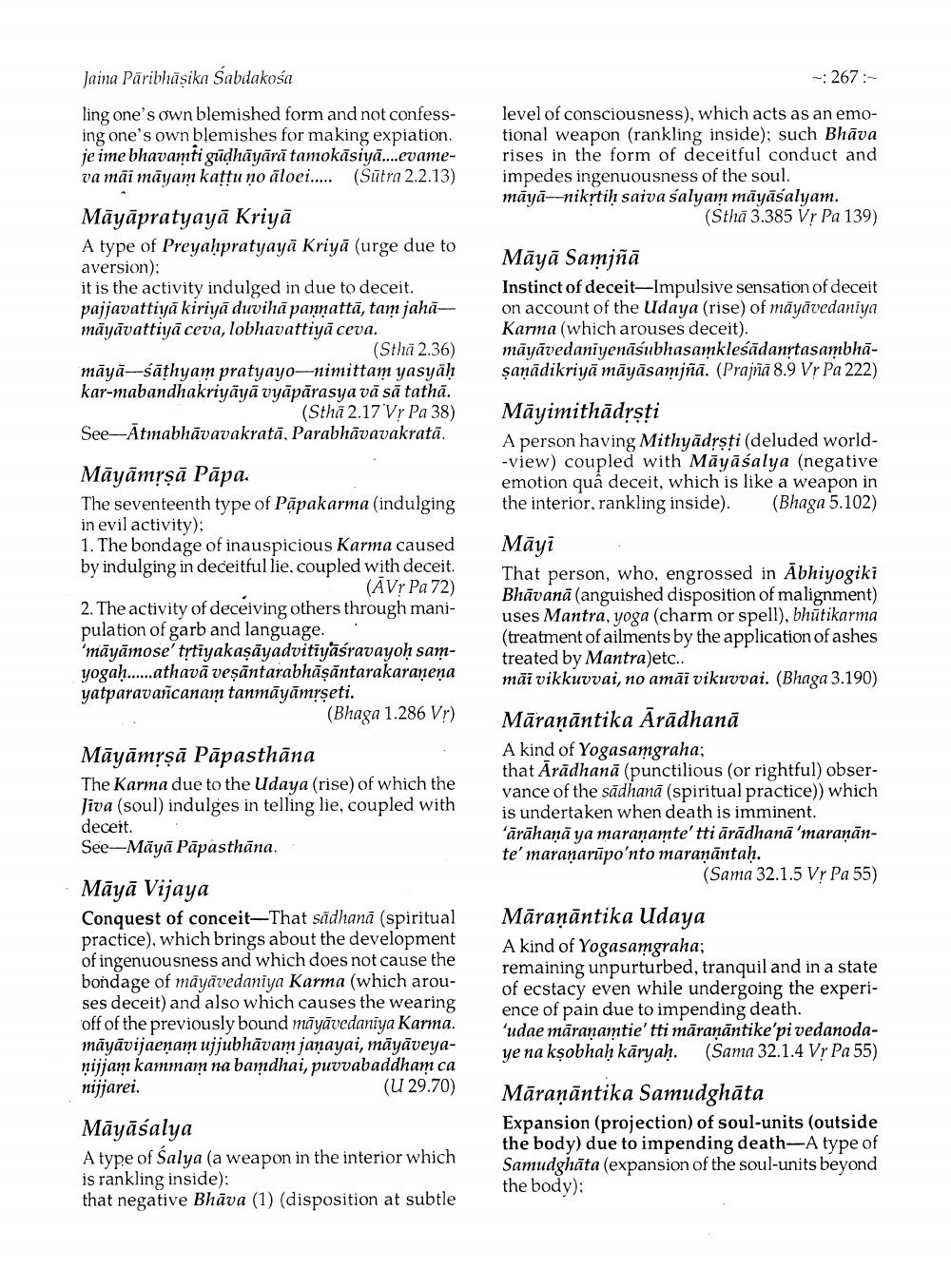________________
Jaina Pāribhāșika Sabdakosa
267 :
ling one's own blemished form and not confessing one's own blemishes for making expiation. je ime bhavamti gūdhāyārā tamokāsiyā....evameva māi māyam kattu ņo āloei..... (Sūtra 2.2.13)
level of consciousness), which acts as an emotional weapon (rankling inside); such Bhāva rises in the form of deceitful conduct and impedes ingenuousness of the soul. māyā--nikrtih saiva salyam māyāšalyam.
(Sthā 3.385 Vr Pa 139)
Māyāpratyayā Kriyā A type of Preyahpratyayā Kriyā (urge due to aversion); it is the activity indulged in due to deceit. pajjavattiyā kiriyā duvihā pannattā, tam jahamāyāvattiyā ceva, lobhavattiyā ceva.
(Sthā 2.36) māyā---sathyam pratyayo-nimittam yasyāḥ kar-mabandhakriyāyā vyāpārasya vā sā tathā.
(Sthā 2.17 'Vr Pa 38) See-Atmabhāvavakratā, Parabhāvavakratā.
Māyā Samjñā Instinct of deceit-Impulsive sensation of deceit on account of the Udaya (rise) of māyāvedaniya Karma (which arouses deceit). māyāvedaniyenāśubhasamklešādantasambhāşaņādikriyā māyāsamjñā. (Prajna 8.9 Vr Pa 222)
Māyimithādrsti A person having Mithyādrsti (deluded world-view) coupled with Māyāśalya (negative emotion quâ deceit, which is like a weapon in the interior, rankling inside). (Bhaga 5.102)
Māyāmrşā Pāpa. The seventeenth type of Pāpakarma (indulging in evil activity); 1. The bondage of inauspicious Karma caused by indulging in deceitful lie, coupled with deceit.
(AVr Pa 72) 2. The activity of deceiving others through manipulation of garb and language. 'māyāmose' trtiyakaşāyadvitiyasravayoḥ samyogaḥ......athavā veşāntarabhāṣāntarakaraņeņa yatparavañcanam tanmāyāmrşeti.
(Bhaga 1.286 Vr)
Māyi That person, who, engrossed in Abhiyogiki Bhāvanā (anguished disposition of malignment) uses Mantra, yoga (charm or spell), bhūtikarma (treatment of ailments by the application of ashes treated by Mantra)etc.. māi vikkuvvai, no amāi vikuvvai. (Bhaga 3.190)
Māyāmrşā Pāpasthāna The Karma due to the Udaya (rise) of which the Jiva (soul) indulges in telling lie, coupled with deceit. See-Māyā Pāpasthāna.
Māranāntika Ārādhanā A kind of Yogasamgraha; that Ārādhanā (punctilious (or rightful) observance of the sādhanā (spiritual practice)) which is undertaken when death is imminent. 'ārāhaņā ya maranamte' tti ārādhanā 'maraṇānte' maranarūpo'nto maranāntah.
(Sama 32.1.5 Vr Pa 55)
Māyā Vijaya Conquest of conceit-That sādhanā (spiritual practice), which brings about the development of ingenuousness and which does not cause the bondage of māyāvedaniya Karma (which arouses deceit) and also which causes the wearing off of the previously bound māyāvedaniya Karma. māyāvijaenam ujjubhāvam jaņayai, māyāveyanijjam kammam na bamdhai, puvvabaddham ca nijjarei.
(U 29.70)
Māraṇāntika Udaya A kind of Yogasamgraha; remaining unpurturbed, tranquil and in a state of ecstacy even while undergoing the experience of pain due to impending death. 'udae māraṇamtie' tti māraṇāntike'pi vedanodaye na kşobhah kāryaḥ. (Sama 32.1.4 Vr Pa 55)
Māyāśalya A type of Salya (a weapon in the interior which is rankling inside); that negative Bhāva (1) (disposition at subtle
Māraṇāntika Samudghāta Expansion (projection) of soul-units (outside the body) due to impending death-A type of Samudghāta (expansion of the soul-units beyond the body);




